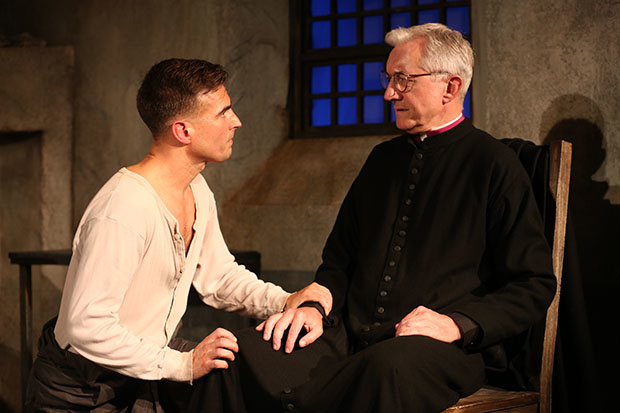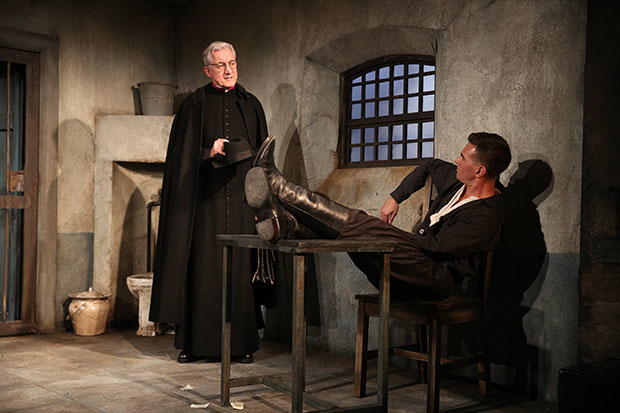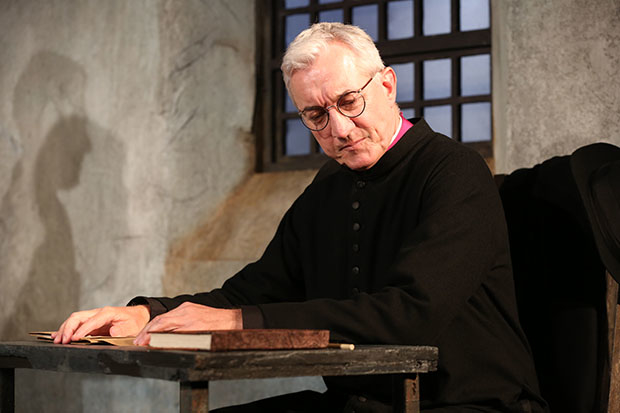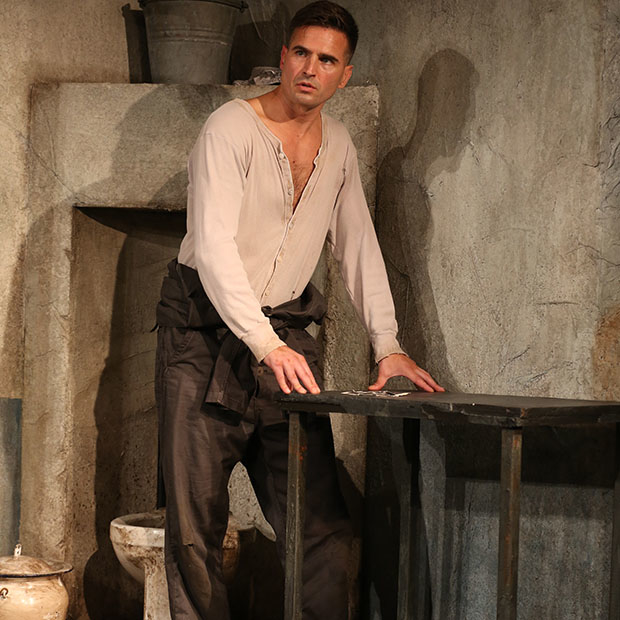Kingfishers Catch Fire Asks: Can a Nazi Be Redeemed?
Robin Glendinning’s world premiere is based on true events.

(© Carol Rosegg)
Who is beyond redemption? The correct Christian answer would be "no one." But if you really think about the specific crimes of brutal police officers, mass murderers, and Nazis, it's hard to muster that kind of blanket forgiveness. Lieutenant Colonel Herbert Kappler was all three of those things, and he is one of the characters in Robin Glendinning's provocative Kingfishers Catch Fire, which takes its title from a poem by Gerard Manley Hopkins. It is now making its exhilarating world premiere at Irish Repertory Theatre.
The other character in this two-hander about real historical figures is Monsignor Hugh O'Flaherty (Sean Gormley), a Vatican official whose exploits in aiding escaped Jews and Allied prisoners so infuriated Kappler (the Gestapo chief in Rome) that he tried to have the priest assassinated. The play begins after the war, with Kappler (Haskell King) safely behind bars, sentenced to life in an Italian prison for his crimes, specifically the reprisal killing of 335 political prisoners at the Ardeatine Caves. While O'Flaherty is ostensibly there to ask after his condition, Kappler suspects a veiled purpose for the visit.

(© Carol Rosegg)
Accusing O'Flaherty of being "fisher of men" (of wanting to convert him to further his own legend), Kappler asks, "I am to be the big catch am I?" His flat Swabian delivery suggests a man who has seen it all. He's a bitter middle manager in the Gestapo who just knows that his monstrous superiors will go free for the sake of politics, while he dies in prison.
With little left to lose, he satisfies himself with trying to convert O'Flaherty, mocking the notion of a merciful God presiding over such a cruel world. He finds much more logic in the petty, feuding pagan Gods (bizarrely, the Greek pantheon instead of the German). King so successfully conveys Kappler's reductio ad absurdum and smug superiority that viewers might recognize it as the style favored by the contemporary disciples of atheist prophets Richard Dawkins and Christopher Hitchens. Kingfishers led me to reflect on how unsurprising it is that a faction of this group has evolved into the so-called "alt-right" (which students of German language and history will recognize as indistinguishable from the old right). This is a kind of nastiness that can only be born from deep resentment and a desire to share the misery. Even if Kappler fails to make a pagan of the priest, he will at least leave him swimming in doubt.

(© Carol Rosegg)
But Gormley portrays O'Flaherty as a clergyman who comes equipped with his own doubt. Kind but deeply flawed, his Catholic forbearance masks a deep pride in his reputation as the "Scarlet Pimpernel of the Vatican." Later in the play, he confesses to spinning his tales for his own enjoyment: "The more that I promise myself that I won't give another interview I find I am once again telling the story of my escape through the coal shoot in the Palazzo Doria," he admits, "and God forgive me I can't help improving them…it's another curse of my race." Even lapsed Catholics will find it hard not to warm to Gormley's intensely human performance.
King also finds the humanity in his character — admittedly a much heavier lift. His steely exterior tells one story, but his frightened-little-boy eyes tell another. Both actors exploit the intimacy of the W. Scott McLucas studio theater to deliver subtle yet powerful performances.
Betraying its origins as a radio play, Kingfishers Catch Fire is a lot of talk, with very little physical action. It is easy to imagine a boring production of this play, but the fact that there's never a dull moment is a testament to both the heroic performances of the actors and Kent Paul's unexpectedly tense staging.

(© Carol Rosegg)
Visually, no detail has been overlooked. Edward T. Morris has fashioned Kappler's cell with authentic grime, right down to the scratchy toilet paper. Linda Fisher's costumes tell their own story: Kappler's prison jumpsuit is ragged in the first act, as if he expects he will not need it once Hitler escapes from Elba and resumes the war. By the second act, he sports fresh undergarments, suggesting that he has come to terms with life behind bars and intends to make it as pleasant as he can. Glendinning suggests that such capitulation to reality is what allows for the greatest revelations.
When Kappler confesses his crimes in Rome and asks O'Flaherty if he thinks he is crazy, the Monsignor replies, "No, just horribly sane." We're quick to talk about mental health in the aftermath of a mass murder, ignoring the cold logic required to perpetrate killing on a grand scale. Kingfishers Catch Fire asserts that the insane monster killer is a comforting fiction, while the rational human with the potential for both compassion and cruelty is the much more challenging truth of the matter.









